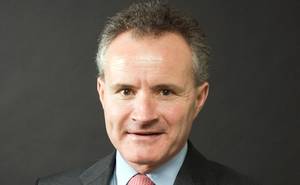Macro headwinds, but domestic improvement
There have been some tangible signs that confidence is slowly returning to Europe, although recent gross domestic product (GDP) numbers and industrial figures have been lacklustre. The unemployment rate for Europe, while still at elevated levels compared to historical averages, has begun to fall. New car sales are also rising – job security makes a new car purchase a far easier decision. There are, nonetheless, a range of significant hurdles to overcome, not least the consequent impact of the escalating crisis in Ukraine.
Growth still remains fragile in Europe and the European Central Bank (ECB) recently implemented a package of measures aimed at helping to shift growth up a gear. While ECB intervention could stimulate a slow and stuttering recovery, it may not be the ‘silver bullet’ that many commentators are hoping for. Inflation has remained stubbornly low; due in part to the strength of the euro, and this has fuelled fears about the risk of deflation. But Europe is not alone in struggling to address the structural issues that are impeding growth; it is a global problem. The ECB will certainly be hoping to see some currency weakness in the second half of 2014, which would aid exporters.
Fresh opportunities to access global leaders
It is easy for investors, particularly in other parts of the world, to read the news, look at the uncertain macro backdrop and panic about Europe. But we believe that this is the wrong response. Uncertainty creates mispricing in the market, providing an opportunity for active stock pickers, such as ourselves, to generate alpha.
One of Europe’s strengths remains the fact that companies in the region are in many cases global leaders. Such companies include Roche, the Switzerland-based pharmaceuticals company, a leader in oncology and haematology, and German tyre and vehicle components manufacturer Continental, which is benefiting from a long-wave cycle of growing demand for active safety components in cars.
The global reach of European companies and the breadth of their sources of revenue allow European equity portfolios to be adjusted towards companies with exposure to those regions with the most compelling opportunities. Over the past 18 months we have focused more on ‘Domestic Europe’; holding attractively valued companies with more domestically focused operations. Recent economic uncertainty, however, has led some macro investors to cut their exposure to Europe and we believe that this has created a fresh opportunity to invest in global names at appealing prices.
Corporates looking to put cash to work
On the corporate side, we are seeing pressure grow on cash-rich companies to spend capital on merger and acquisition activity, or to return it to investors through dividends. We would not be surprised, in this late-stage, but still very strong bull market, to see a boom in merger and acquisition activity in large-cap stocks. This, combined with the separation of macro and micro, leaves us particularly constructive on the potential for equity markets to move higher in the coming months.
Rewarding environment for stock pickers
Following the financial crisis, Europe saw a rise in the correlation between the performance of the winners and losers of European equity markets. Good stocks and bad stocks moved in unison, largely irrespective of quality or value. This eroded the value that fund managers could add through strong stock selection. Since early 2012, however, as chart 1 here shows, this trend has reversed, with stock pricing correlations falling back towards their longer term average. This has created better conditions for active managers to outperform through good stock selection.
Chart 1: Falling correlation favours stockpickers
Source: BofA Merrill Lynch European Investment Strategy, Thomson Reuters DataStream, as at 13 August 2014. ‘1yrMvgAvg’ refers to a one-year moving average of pricing correlations in Europe.
The lower correlation is understandable. As the crisis recedes, less attention is paid to the macro picture and more focus is given to corporate fundamentals, not the least of which is earnings. The re-rating in European equities has so far been driven by the ‘price’ in the price to earnings (P/E) ratio, but the margin expansion story has largely run its course. We have yet to see the highly anticipated growth in earnings that would justify further gains. Earnings growth was disappointing in 2013 and we expect that market direction will ultimately be driven by whether or not the optimistic estimates for 2014 and 2015 (Citi consensus estimates at 8 per cent and 13 per cent respectively) can be met. While we wait for confirmation, our portfolio remains constructively positioned to try and capitalise on the opportunities provided by ‘global Europe’ and cash-rich corporates.
Opinion columns by John Bennet, Portfolio Manager of the European Selected Opportunities Strategy, Henderson Global Investors.



